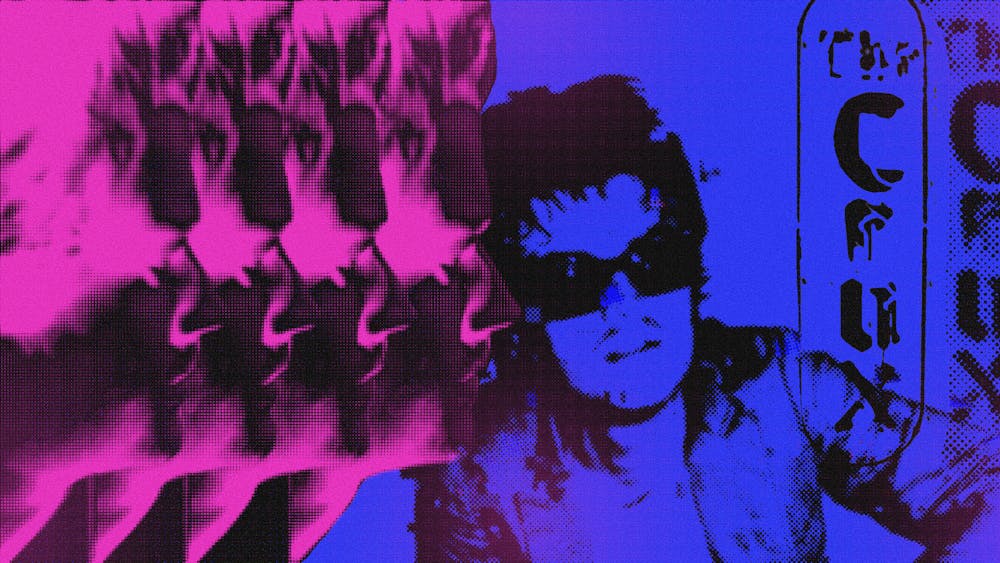Djo had quite the year in 2024—a spike in success spurred by the sudden popularity of “End of Beginning”—a single from his 2022 album DECIDE. It became the alternative, nostalgia–provoking power–ballad of the summer. In a way, Djo proved that you could have it all—a successful acting career starring in one of the biggest shows on Netflix and a top 20 mega–hit to boot. Riding the wave of this success, Djo announced his triumphant return this year with his third studio album, The Crux, a concept album where he details his adventures through the lens of a fictional hotel and its guests. Really, the record has emerged as some kind of performance test for the artist: Will he be able to recapture the hearts of his audience again, or is it … djover?
The album opens with a strong The Strokes–esque track “Lonesome Is A State of Mind.” In his lyrics, Djo reflects on a life that is both unfulfilling and mundane ever since what can only be inferred as an unfortunate recent heartbreak. “I swear I've had this dinner before / I know I've heard that song / My future's not what I thought / I think I thought it wrong,” he sings. The production is a perfect blend of psychedelic and synth, and the singer does a great job of setting up a prevailing theme of the rest of the album: to use his words, “29 and misaligned.”
But for all of the record’s indie–pop glamour, there is a very millennial quality to some of the tracks—so much so, that it’s easy to glean some kind of gaudy, disco sound. The album’s primary single—“Basic Being Basic”—is set to a production that sounds uncannily like a non–descript score in the background of any '80s movie you can think of. The lyrics are trying to be deep, but he doesn’t really get there. One of several philosophical insights—“I think you're scared of bein' basic / That’s ironic 'cause it's reading like you're even more basic”—reads more like a “pushing 40” complaint and less like proverbial insight. He follows by critiquing the supposed superficiality of our society, explaining he just wants “simple pleasures” and “real love.” It’s a sweet sentiment, but far from innovative; instead resemblant to a very surface–level, beat–to–death, heard–again commentary about how we need to forget about what's on the outside and search for the “real things” in life. The song is scared of being basic, which is ironic because it’s reading like it’s even more basic. Also, points docked for including the word “cheugy.”
The third track, “Link,” also feeds into the crisis narrative, this time describing frustrations with having to live life after high school. While the song just feels like it would buy avocado toast, the metaphor is less lost on me. You might infer that this sentiment represents a deeper underlying message about the burnout Djo’s faced ever since reaching one standard of success: “I just graduated / Top of my class / Furthest from last / So why do I feel so bad?” he sings. Unfortunately, the metaphor is just not well–executed. “Breakin' outta the chain” reads like a Disney Channel “It’s not my dream, dad, it’s yours” moment as opposed to the insightful revelation of emotion the artist wants it to be.
Despite the record’s disappointments, there are some great tracks on the album. The second single, “Delete Ya”, is a catchy, simply produced '80s–style track where Djo wishes he could simply forget about the person who broke his heart. “Oh, God, I wish I could delete ya / 'Cause nothing can compete with ya,” he sings. The song plays on nostalgia and fun analogies like, “I'm a boat that's sinking, guess who's the sea” and name–dropping his fellow Stranger Things co–star Charlie Heaton, while maintaining a somehow devastating quality. Another excellent track is “Fly”, a stunningly produced yet stripped–back song, switching between acoustic guitar and a soft, blissful synth. He sings candidly about the struggle to leave behind a relationship and trying to start fresh. “No, I don’t look back in anger / Do you?” he repeats. “Golden Line” is predominantly a piano track, reminiscent of Billy Joel, in which he sings vulnerably about his love and devotion. The instrumental is also great, and the lyrics feel very open and candid.
The Crux definitely has its strengths, showcasing some beautiful instrumentals and production with some catchy, great lyrics, however, a dark cloud of shortfall looms over the album. It’s obvious that Djo stuck to the successful '80s synth sound and nostalgia of “End of Beginning” in an attempt to evoke the same lyricism and aura that landed him his biggest hit back in 2024. Unfortunately, he just couldn’t deliver 100% of the time. His prevailing desire to replicate a previous success left the majority of the record emulating a “I’m 14, and this is deep” sentiment, set to the background of an '80s movie trailer–esque production.
Not to mention the fact that this was allegedly a concept album—there was no concept in sight, unless you count the narrative that he’s almost thirty and might crash out. That being said, the album’s better tracks felt less “End of Beginning” wannabes and leaned more into what felt like a stripped–back, “no frills” Djo that was just trying to make something cool. This simplicity, as opposed to elaborate commentary and production, is what really did the trick. But at the end of the day, it’s up to Djo to decide where his career takes him next—will he chase the DECIDE high forever, or realize the beauty in honest expression? I remain optimistic.

